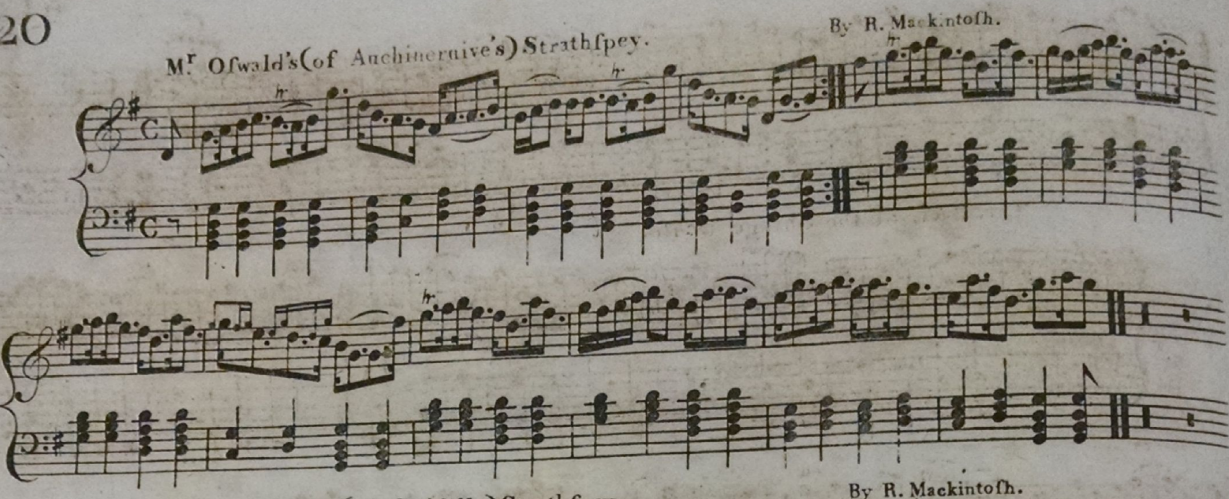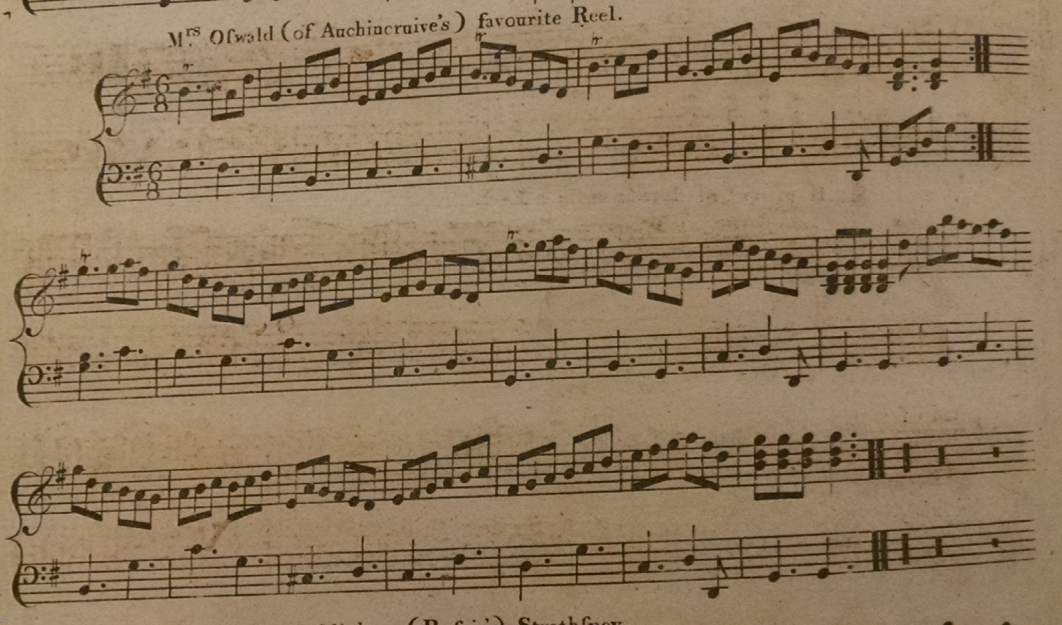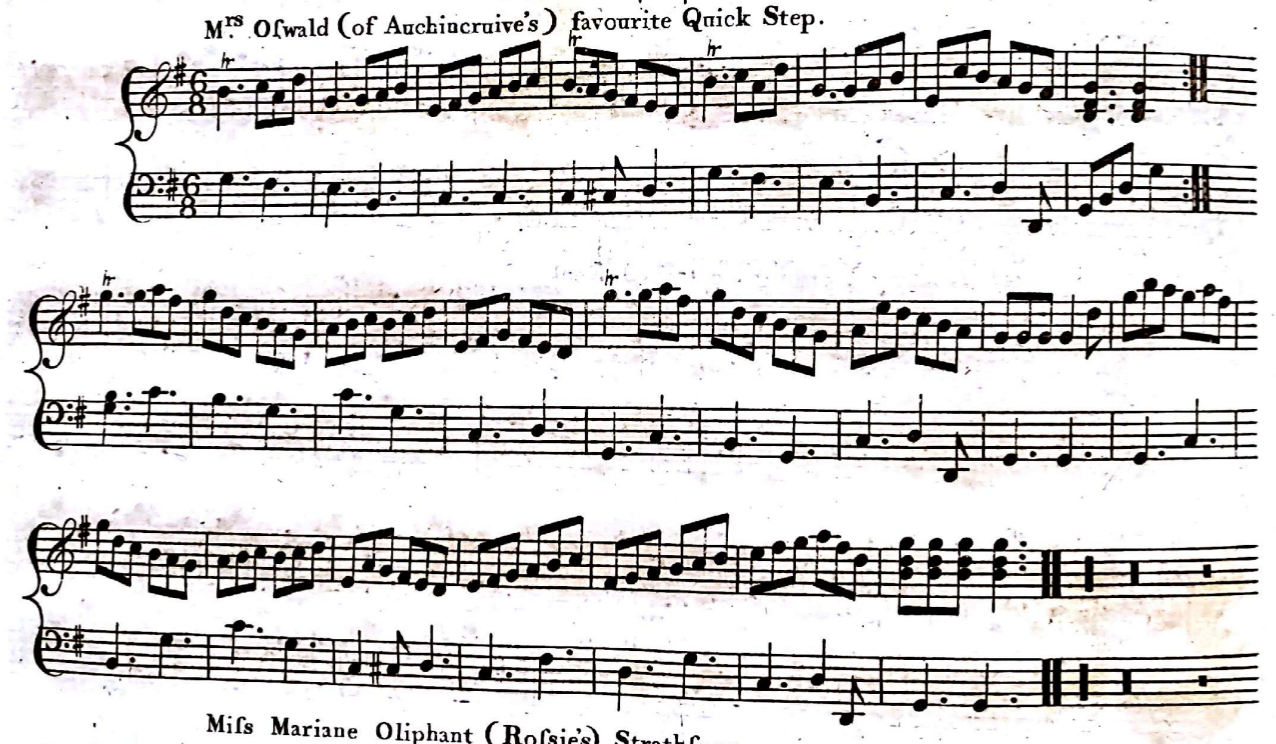August Tune of the Month: Robert Mackintosh Set
Robert Mackintosh has been my favorite composer ever since his second collection was the featured volume at the 2006 session of the Jink and Diddle School of Scottish Fiddling, and it’s been an immensely satisfying experience to sort of grow up with him—I started by just wanting kickin' strathspeys and such, but when I got into more continental dance forms (such as the minuet)…I found that he had some very nice ones. When I started looking at sonatas, he furnished a lovely one. Recent harmonic explorations have exposed me to some of his exquisitely-crafted bass lines and harmonic progressions. He’s really the perfect “sample pack” of everything Scottish fiddling had to offer in the mid-to-late 18th century, and it’s no coincidence that he’s the focus of my fellowship work at the Newberry Library.

Anyway, here are two of his dance tunes, both about the Oswalds of Auchincruive. They were obviously important supporters of his work: I only have access to the subscriber list for his second collection—which Miss Oswald of Auchincruive appears on— but Mrs. Oswald is also the dedicatee of his third collection, and there are countless tunes dedicated to Mrs., Miss, and Mr. Oswald scattered throughout his books.
Auchincruive House is in South Ayrshire and was bought by the Oswalds in 1764. More information about the house and Richard Oswald are available on, er, Wikipedia.
The strathspey is from his third collection (1796), and sounds particularly charming played slowly. The grace notes in bar four of the B section look like ossia to me—you can see that I avoided them the first time through and played them the second time. It’s worth noting that the Highland Music Trust’s mostly-excellent urtext breaks the beaming on them, making them look like standard grace notes (which make no sense musically). Beware of strange things found in modern editions! Nothing beats the original!
The second tune is from Mackintosh’s second collection (of 1792 or 93; accounts differ). It is, of course, a tune that looks like a jig and is labelled a reel, something Mackintosh was prone to produce. My best theory about that right now is that “reel” refers to a tune used to dance the reel (see also), and that this could be done by a tune played quickly in either common time or 6/8. Mackintosh does use “jigg” upon occasion, but this seems to refer to the more Italianate giga, unsuitable for country dancing.
But wait, there’s more! The first facsimile below (with the “favourite Reel”) is from the NLS’s copy. But the Newberry Library here in Chicago has an earlier edition of the same collection, and several 6/8 reels are labelled “Quick Step”, this being one of them. I don’t have any answers about this. There is a single quick step in the later edition (Mrs. Stennet’s Quick Step), but that’s dwarfed by the fourteen in the earlier one. And the earlier one does have a single 6/8 reel (Mr. John Trotter’s Reel). So it’s not simply a case of him finding one word superior early and the other word superior later.
Quick steps were certainly used in military contexts for quick marching (defined in the drill manuals as 120bpm, in contrast to the much statelier 60bpm of the regular march (which in practice was often upped to around 75bpm)). Countless regimental quick steps exist, and the Aird collection advertises quick steps for the fife. All of which makes sense in a military context, which would be wonderful if we were in a military context.
It was of course anomalous for the violin to be used for marching troops around (although there is at least one hilarious account of it happening), and I highly doubt Mackintosh was remotely concerned with the concerns of the military. It would make much more sense for there to be a civilian dance called the quick step, but I have not heard of one so far. Perhaps it was relatively obscure, inspiring Mackintosh to rebrand the tunes as reels? Perhaps there are limited occasions for civilians to march in quick time to the sound of the violin? Who knows. Further information is very welcome, please let me know if you have any insight.
Anyway, musicological issues—though important—shouldn’t diminish from the pleasure of hearing and playing the music. Enjoy the tunes!



